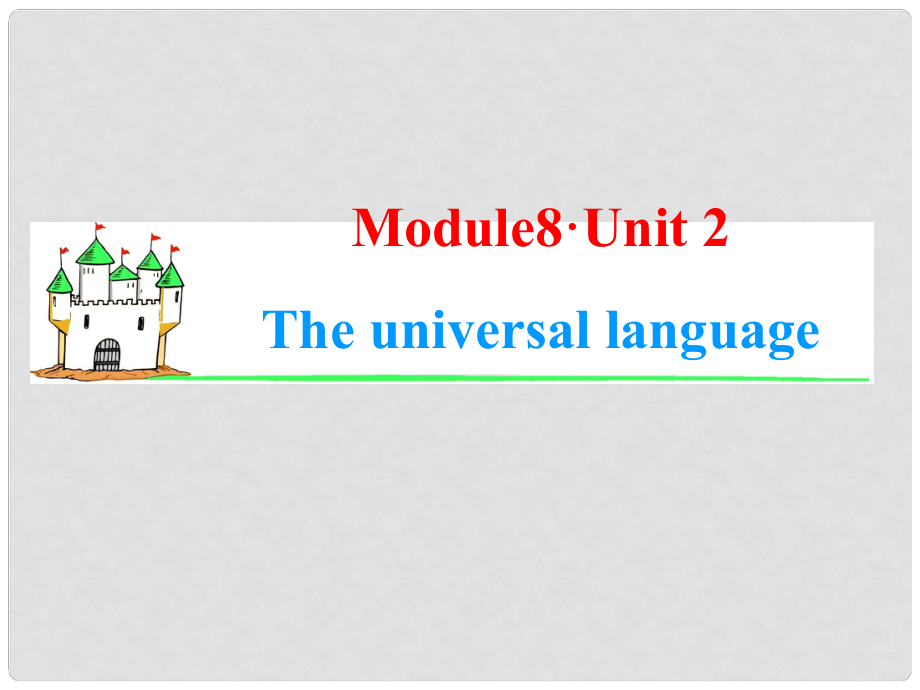《高中英語(yǔ)一輪總復(fù)習(xí)(知識(shí)運(yùn)用+拓展)Unit 2 The universal language課件 牛津譯林版選修8》由會(huì)員分享����,可在線閱讀����,更多相關(guān)《高中英語(yǔ)一輪總復(fù)習(xí)(知識(shí)運(yùn)用+拓展)Unit 2 The universal language課件 牛津譯林版選修8(25頁(yè)珍藏版)》請(qǐng)?jiān)谘b配圖網(wǎng)上搜索�。
1�����、Module8Unit 2The universal language1�、demandn. 要求,需求demand to do sth. 要求做某事Good secretaries are always in demand. 好的秘書(shū)總是很多人都需要的�����。Do you think the President will give in to the terrorists demand? 你認(rèn)為總統(tǒng)會(huì)對(duì)恐怖分子的要求讓步嗎�?1、demandv. 要求��,查問(wèn)����,需要I demand an apology. 我要求道歉。 注意:在demand后面的賓語(yǔ)從句中�,謂語(yǔ)動(dòng)詞要用“should do”的虛擬語(yǔ)氣形
2、式���。老板要求瑪麗在一周內(nèi)完成它��。The boss _ that Mary _ it within a week. demanded; (should) finish2�、seize v.抓住,奪?��?�;利用采納(on/upon)����;沒(méi)收Seize the chance, otherwise youll regret it. 抓住這個(gè)機(jī)會(huì)���,否則你會(huì)后悔的���。 Before he could run away, she seized him by the collar. 他還沒(méi)來(lái)得及逃跑,她就抓住了他的衣領(lǐng)�。 He would seize upon any excuse to justify himself
3、. 他會(huì)利用任何借口為自己辯解��。 They seized the drugs and arrested the people on the boats. 他們沒(méi)收毒品�,逮捕船上的人。arrest, capture, catch, seize, trap這些動(dòng)詞均有“抓住����,捕捉”之意��。arrest 指根據(jù)法律或命令進(jìn)行逮捕并予以監(jiān)禁或拘留。capture 指通過(guò)武力或計(jì)謀等�����,戰(zhàn)勝抵抗而捉住敵人或動(dòng)物�。catch 普通用詞,指捉住跑動(dòng)或隱藏中的人或動(dòng)物����,一般指活捉。seize 側(cè)重指以突然�����、有力地動(dòng)作迅速抓住或捉住����。trap 多指誘捕。seized on 她采納了我的建議�����,馬上干了起來(lái)����。 She
4���、_ my suggestion and began work immediately. 3、decline vi. 減少��,衰退His interest in the project declined after his wife died.在妻子死后���,他對(duì)這個(gè)項(xiàng)目的興趣減少了�����。vt. 拒絕��,謝絕I invited him to the meeting but he declined.我邀請(qǐng)他參加會(huì)議�,但他拒絕了�。decline to do sth. 謝絕做某事They declined to tell me how they had got my address.他們拒絕告訴我他們是怎樣獲得我
5、的地址的����。3、decline n. 衰退��,減少on the decline 衰退中�,走下坡路She seemed to be recovering and then she went into a decline.她好像在康復(fù),后來(lái)身體又垮下去了。A考查動(dòng)詞的辨析��。句意:“你還生她的氣嗎�?”“不見(jiàn)得��,但是我不否認(rèn)她的話傷害了我�����?!眃eny否認(rèn),否定�����; refuse, reject, decline都是“拒絕”的意思�����。故選A����。 Are you still mad at her? Not really, but I cant _ that her remarks hurt me. A. deny
6、B. refuse C. reject D. decline4�、 scold v. 責(zé)罵,訓(xùn)斥Dont scold the child without reason. 不可無(wú)緣無(wú)故地責(zé)罵小孩。You shouldnt scold him on the slightest excuse. 你不應(yīng)該以一點(diǎn)點(diǎn)借口就責(zé)罵他�����。I hate to scold you, but you mustnt scatter your things all over the place. 我不想訓(xùn)斥你����,但你總不該把東西到處亂丟。scold sb. (for sth./doing sth.) (因某事/做某事)叱責(zé)某人
7���、他讓他母親不安��,因此他父親責(zé)罵他�。His father scolded him for upsetting his mother. to scold這個(gè)不孝順的兒子越出常軌譴責(zé)父母����。The disobedient son went out of his way his parents.5、condemn vt. 判刑�����,處刑�;譴責(zé),聲討The judge condemned/sentenced the thief to six months imprisonment. 法官判這個(gè)賊6個(gè)月監(jiān)禁���。The papers were quick to condemn him for his mistake
8�����、. 報(bào)紙及時(shí)地指責(zé)他的錯(cuò)誤���。 The water was condemned as unfit to drink. 這種水被宣告不宜飲用。 condemn sb. to sth./to do sth. 使某人注定怎么樣As an old person, one is often condemned to live alone. 老年人常常注定要孤孤單單地生活�����。6����、tendency n. 趨勢(shì),傾向�����,秉性There is a tendency towards regional cooperation. 有一種地區(qū)性合作的趨勢(shì)�����。There is a growing tendency for peo
9��、ple to work at home instead of in offices. 人們?cè)诩依锒皇窃谵k公室里工作的趨勢(shì)日益增長(zhǎng)。central tendency 集中趨勢(shì)communicative tendency 社交傾向 world tendency 世界趣向determining tendency 決定性趨勢(shì) upward tendency 上漲的趨勢(shì)�;看漲tendency; social現(xiàn)在,越來(lái)越多的人傾向于不參加社會(huì)活動(dòng)�。Today there is a _ for people to drop out of _ activity.1、Just imagine performi
10�����、ng such an opera in the Forbidden City there could not be a more awesome setting! 試想在紫禁城上演這樣一部戲劇這樣的背景再好不過(guò)了���!當(dāng)cant (couldnt) 與形容詞的比較級(jí)形式連用時(shí)����,往往不在于否定謂語(yǔ)動(dòng)詞�,而是在于加強(qiáng)全句的語(yǔ)氣,此外��,cant (couldnt) 的習(xí)慣用法也常具有特殊的強(qiáng)調(diào)功能�����。否定詞never, no, not, nothing等與比較級(jí)連用時(shí)�����,往往表達(dá)最高級(jí)含義。Nothing in the world is more pretty than that same species
11�、of defense. 世上再?zèng)]有比這種防衛(wèi)更漂亮的技巧了。I have never seen a man more hardworking than he. 我從來(lái)也沒(méi)看見(jiàn)比他還要勤奮的人�。cant / can nevertoo/enough表示“越越好;無(wú)論怎樣也不過(guò)分”��。We cant thank him enough. 我們無(wú)論怎樣感謝他也不過(guò)分����。You cannot be too careful(You can never be careful enough) to do your homework. 你做作業(yè)越仔細(xì)越好(無(wú)論怎樣仔細(xì)也不過(guò)分)。2 ��、Wanting to prote
12���、ct the father, Liu claims that she alone knows the name, but resists telling Turandot.為了保護(hù)她的父親,柳兒說(shuō)她一個(gè)人知道這個(gè)名字�����,但她拒不告知圖蘭朵��。句中現(xiàn)在分詞wanting 作目的狀語(yǔ)�����。resist 后面跟動(dòng)名詞。Getting to the bus station earlier, he took a taxi without breakfast. 為了早點(diǎn)到車站���,他打了車�����,早飯也沒(méi)吃��。She cannot resist giving him advice. 她忍不住給他提了建議����。我還不想公開(kāi)我那些會(huì)引起爭(zhēng)論的觀點(diǎn)����,寧可暫且隨大流。 my controversial views known yet, I preferred to follow the crowd for a while. Not wanting to make
 高中英語(yǔ)一輪總復(fù)習(xí)(知識(shí)運(yùn)用+拓展)Unit 2 The universal language課件 牛津譯林版選修8
高中英語(yǔ)一輪總復(fù)習(xí)(知識(shí)運(yùn)用+拓展)Unit 2 The universal language課件 牛津譯林版選修8

